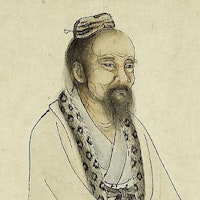Pure Spirit reaches in the four directions, flows now this way, now that—There is no place it does not extend to.
Pure Spirit reaches in the four directions, flows now this way, now that—There is no place it does not extend to.
Chuang Tzu

One with Heaven
Topic: Immanence & Transcendence
Pure Spirit reaches in the four directions, flows now this way, now that—There is no place it does not extend to. Above, it brushes Heaven; below, it coils on the earth. It transforms and nurses the ten thousand things, but no one can make out its form. Its name is called One-with-Heaven.The way to purity and cleanness is to guard the spirit, this alone, guard it and never lose it, and you will become one with spirit, one with its pure essence, which communicates and mingles with the Heavenly Order.
Chuang Tzu, also known as Zhuang Zhou or Zhuangzi, was a luminous presence in an era of transformative thought. He lived around 350 BC, a time of remarkable intellectual ferment in China. As a Taoist philosopher, he embraced a worldview that emphasized balance, the rhythm of nature, and the pursuit of a deeply personal understanding of the universe. His teachings centered on the Tao, a profound concept that represented the underlying order and essence of the cosmos. Unraveling the mystery of the Tao was not about conquering or controlling it, but rather about aligning oneself with its fluid, natural ebb and flow.
Over the millennia, Chuang Tzu's wisdom has been distilled into a collection of sayings, passed down from generation to generation. These teachings, written with a depth and eloquence that resonates across the ages, offer a profound and transformative exploration of existence and our place within it. They invite us to question conventional wisdom, to see the world from different perspectives, and to embrace the inherent uncertainties of life. In their enchanting simplicity and their profound depth, Chuang Tzu's words hold a mirror to our deepest selves, asking us to reflect on who we are and how we relate to the world around us.
These timeless teachings of Chuang Tzu have found resonance far beyond the Taoist tradition. They have become one of the fundamental sources for Zen Buddhism, a spiritual path that shares Taoism's emphasis on mindfulness, simplicity, and the pursuit of enlightenment through direct experience. In this way, Chuang Tzu's legacy reaches across the centuries, touching lives and shaping philosophies far beyond the borders of his own time and place. His wisdom continues to illuminate the path for those seeking understanding, inviting us all to engage deeply with the mysteries of existence and our place within the cosmos.
Wilson, Andrew, editor. World Scripture - a Comparative Anthology of Sacred Texts. Paragon House, 1991, p. 602 [Chuang Tzu 15].

Chuang Tzu
Theme: Intimate Divinity

Chuang Tzu (4th Century BC)
Born in the 4th Century BC, Chuang Tzu* like Lao Tzu, is one of the principal sages of Taoism. Taoism is best known through its doctrine of wu wei (which literally means “pure effectiveness”, in that, “action in the mode of wu wei is action in which friction—in interpersonal relationships, in intrapsychic conflict, and in relation to nature—is reduced to the minimum”). However, of interest to the current essay is the nondualism (and its inherent immanence and transcendence) that was expressed by Taoist sages such as Chuang Tzu. As stated by Aldous Huxley, “In the Taoist formulations of the Perennial Philosophy there is an insistence, no less forcible than in the Upanishads, the Gita and the writings of Shankara, upon the universal immanence of the transcendent spiritual Ground of all existence.”
—Aldous Huxley (1970, p. 7); Huston Smith (1991, p. 200). [*Changed name spelling from Chang Tzu to Chuang Tzu.—AD].
Additional Chuang Tzu Quote
Ch’i (Qi)
Ch’i (Qi) is the spiritual energy pervading all things. Taoist meditation called Chi Gong and martial arts such as T’ai-Chi, employ physical exercises to cultivate the ch’i, unite with its flow, and harness its power, resulting in inner tranquility and spiritual vigor. In meditation controlling the ch’i begins with controlling the breath…
Resources
Related Quotes
Copyright © 2017 – 2026 LuminaryQuotes.com About Us